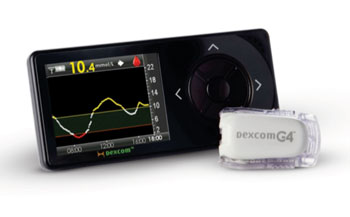Professional CGM System Improves Glucose Control 
|
By HospiMedica International staff writers Posted on 25 Jun 2014 |

Image: The Dexcom G4 PLATINUM Professional CGM (Photo courtesy of ourtesy Dexcom).
A professional continuous glucose monitoring (CGM) system allows doctors and patients to review glucose data retrospectively, assisting therapeutic treatment management.
The Dexcom G4 PLATINUM Professional CGM consists of a practice-owned professional CGM system and sensors. Patients are first placed on the device for a period of seven days, with two calibration measurements using a blood glucose meter performed daily. Dynamic and comprehensive data is collected and shared with the patient, which aids in their understanding of the impact between behavior and glucose activity. Clinicians can use these insights to adjust therapy and to educate and motivate patients to modify their behavior after viewing the effects that specific foods, exercise, stress, and medications have on their glucose levels.
Following setup, the system provides continuous readings on the rate and direction of glucose change up to every five minutes, supporting therapy adjustments and treatment recommendations. The system can also be customized for personalized glucose targets and alerts, and has an alarm feature to alert the user if glucose levels rise or fall to dangerous levels. The system has an extended 6-meter range1, and a sleek receiver available in three vibrant colors. The Dexcom G4 PLATINUM Professional CGM is a product of Dexcom (San Diego, CA, USA), and has been approved by the US Food and Drug Administration (FDA).
“Dexcom’s mission is to provide doctors, patients and caregivers new medical technology to improve their understanding and management of diabetes,” said Terrance H. Gregg, CEO of Dexcom. “The G4 PLATINUM Professional is Dexcom’s latest answer for healthcare professionals and patients seeking novel and insightful tools to optimize therapeutic decisions.”
The traditional standard-of-care for glucose monitoring is a finger stick meter. CGM thus represents the most significant breakthrough in diabetes management in the past 40 years, augmenting the use of glucose meters for the management of diabetes by providing real-time glucose changes with the push of a button, alerting users when glucose is too low or too high. Finger stick meters are still required to calibrate CGMs and for making therapy and meal decisions.
Related Links:
Dexcom
The Dexcom G4 PLATINUM Professional CGM consists of a practice-owned professional CGM system and sensors. Patients are first placed on the device for a period of seven days, with two calibration measurements using a blood glucose meter performed daily. Dynamic and comprehensive data is collected and shared with the patient, which aids in their understanding of the impact between behavior and glucose activity. Clinicians can use these insights to adjust therapy and to educate and motivate patients to modify their behavior after viewing the effects that specific foods, exercise, stress, and medications have on their glucose levels.
Following setup, the system provides continuous readings on the rate and direction of glucose change up to every five minutes, supporting therapy adjustments and treatment recommendations. The system can also be customized for personalized glucose targets and alerts, and has an alarm feature to alert the user if glucose levels rise or fall to dangerous levels. The system has an extended 6-meter range1, and a sleek receiver available in three vibrant colors. The Dexcom G4 PLATINUM Professional CGM is a product of Dexcom (San Diego, CA, USA), and has been approved by the US Food and Drug Administration (FDA).
“Dexcom’s mission is to provide doctors, patients and caregivers new medical technology to improve their understanding and management of diabetes,” said Terrance H. Gregg, CEO of Dexcom. “The G4 PLATINUM Professional is Dexcom’s latest answer for healthcare professionals and patients seeking novel and insightful tools to optimize therapeutic decisions.”
The traditional standard-of-care for glucose monitoring is a finger stick meter. CGM thus represents the most significant breakthrough in diabetes management in the past 40 years, augmenting the use of glucose meters for the management of diabetes by providing real-time glucose changes with the push of a button, alerting users when glucose is too low or too high. Finger stick meters are still required to calibrate CGMs and for making therapy and meal decisions.
Related Links:
Dexcom
Latest Critical Care News
- Novel Intrabronchial Method Delivers Cell Therapies in Critically Ill Patients on External Lung Support
- Generative AI Technology Detects Heart Disease Earlier Than Conventional Methods
- Wearable Technology Predicts Cardiovascular Risk by Continuously Monitoring Heart Rate Recovery
- Wearable Health Monitoring Device Measures Gases Emitted from and Absorbed by Skin
- Groundbreaking Technology Rapidly Detects Airborne Influenza Viruses
- Handheld Device Could Transform Heart Disease Screening
- Flexible Semi-Autonomous Robot Could Deliver Medicine Inside Body

- Neurorestorative Treatment Strategies Hold Promise for Most Severe Forms of Epilepsy
- Gene Discovery Could Help Grow New Heart Arteries
- Study Discovers Invisible Transmission of Common Hospital-Associated Infection
- Non-Invasive Neuro-Ophthalmology Techniques Could Detect Brain Tumors Earlier
- Mass Manufactured Nanoparticles to Deliver Cancer Drugs Directly to Tumors
- World’s Smallest Pacemaker Fits Inside Syringe Tip

- AI-Powered, Internet-Connected Medical Devices to Revolutionize Healthcare, Finds Study
- Starfish-Inspired Wearable Tech Enables Smarter Heart Monitoring
- AI Eye Scans Could Help Identify Heart Disease and Stroke Risk
Channels
Surgical Techniques
view channel
Intravascular Imaging for Guiding Stent Implantation Ensures Safer Stenting Procedures
Patients diagnosed with coronary artery disease, which is caused by plaque accumulation within the arteries leading to chest pain, shortness of breath, and potential heart attacks, frequently undergo percutaneous... Read more
World's First AI Surgical Guidance Platform Allows Surgeons to Measure Success in Real-Time
Surgeons have always faced challenges in measuring their progress toward surgical goals during procedures. Traditionally, obtaining measurements required stepping out of the sterile environment to perform... Read morePatient Care
view channel
Portable Biosensor Platform to Reduce Hospital-Acquired Infections
Approximately 4 million patients in the European Union acquire healthcare-associated infections (HAIs) or nosocomial infections each year, with around 37,000 deaths directly resulting from these infections,... Read moreFirst-Of-Its-Kind Portable Germicidal Light Technology Disinfects High-Touch Clinical Surfaces in Seconds
Reducing healthcare-acquired infections (HAIs) remains a pressing issue within global healthcare systems. In the United States alone, 1.7 million patients contract HAIs annually, leading to approximately... Read more
Surgical Capacity Optimization Solution Helps Hospitals Boost OR Utilization
An innovative solution has the capability to transform surgical capacity utilization by targeting the root cause of surgical block time inefficiencies. Fujitsu Limited’s (Tokyo, Japan) Surgical Capacity... Read more
Game-Changing Innovation in Surgical Instrument Sterilization Significantly Improves OR Throughput
A groundbreaking innovation enables hospitals to significantly improve instrument processing time and throughput in operating rooms (ORs) and sterile processing departments. Turbett Surgical, Inc.... Read moreHealth IT
view channel
Printable Molecule-Selective Nanoparticles Enable Mass Production of Wearable Biosensors
The future of medicine is likely to focus on the personalization of healthcare—understanding exactly what an individual requires and delivering the appropriate combination of nutrients, metabolites, and... Read more
Smartwatches Could Detect Congestive Heart Failure
Diagnosing congestive heart failure (CHF) typically requires expensive and time-consuming imaging techniques like echocardiography, also known as cardiac ultrasound. Previously, detecting CHF by analyzing... Read moreBusiness
view channel
Expanded Collaboration to Transform OR Technology Through AI and Automation
The expansion of an existing collaboration between three leading companies aims to develop artificial intelligence (AI)-driven solutions for smart operating rooms with sophisticated monitoring and automation.... Read more

















